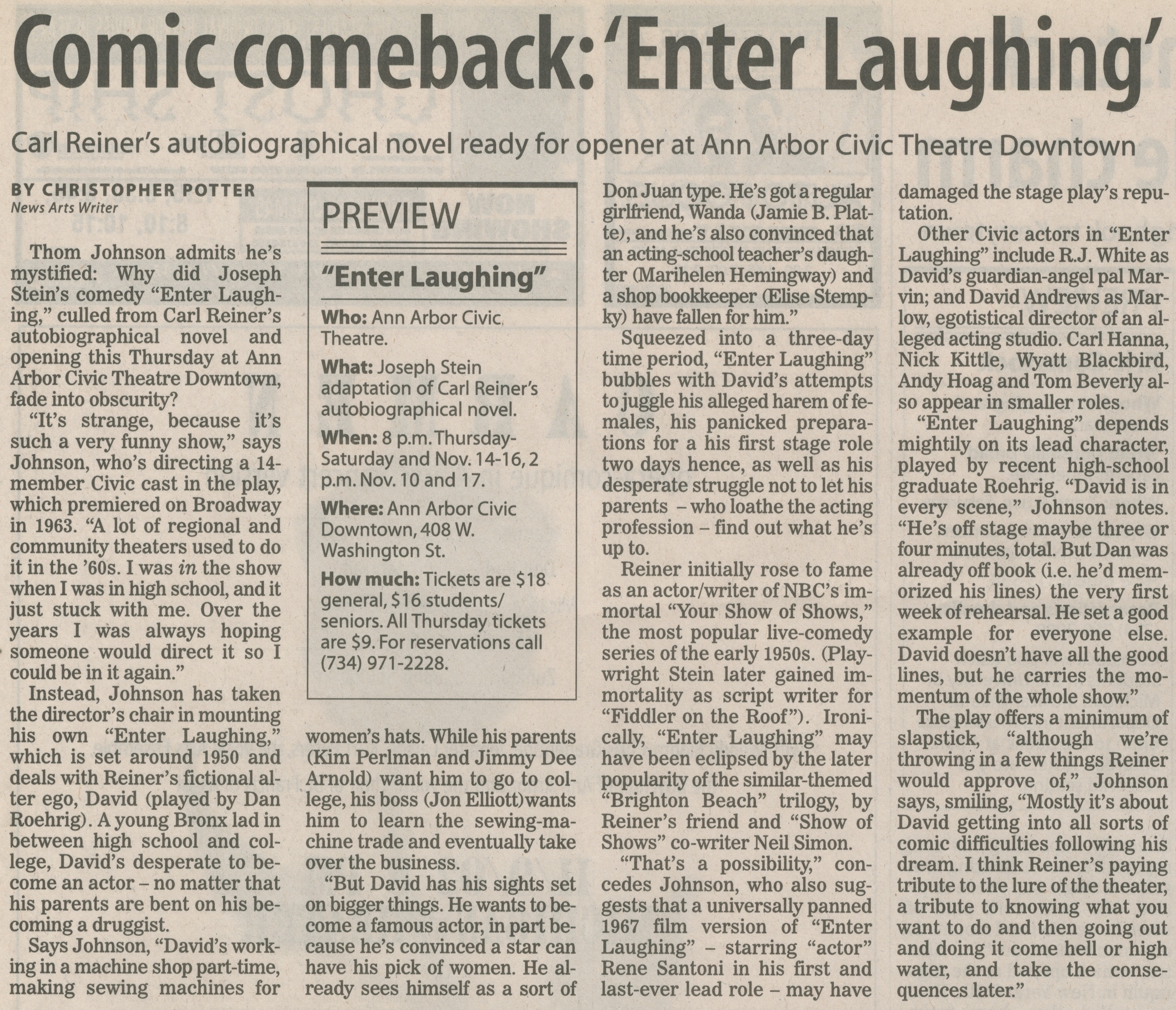Comic Comeback: 'Enter Laughing'

PREVIEW
"Enter Laughing"
Who: Ann Arbor Civic, Theatre.
What: Joseph Stein adaptation of Carl Reiner's autobiographical novel. When: 8 p.m.Thursday-Saturday and Nov. 14-16,2 p.m. Nov. 10 and 17. Where: Ann Arbor Civic Downtown, 408 W. Washington St.
How much: Tickets are $18 general, $16 students/ seniors. All Thursday tickets are $9. For reservations call (734) 971-2228.
Comic comeback:'Enter Laughing'
Carl Reiner's autobiographical novel ready for opener at Ann Arbor Civic Theatre Downtown
BY CHRISTOPHER POTTER
News Arts Writer
Thom Johnson admits he’s mystified: Why did Joseph Stein’s comedy “Enter Laughing,” culled from Carl Reiner’s autobiographical novel and opening this Thursday at Ann Arbor Civic Theatre Downtown, fade into obscurity?
“It’s strange because it’s such a very funny show,” says Johnson, who’s directing a 14-member Civic cast in the play, which premiered on Broadway in 1963. “A lot of regional and community theaters used to do it in the ’60s. I was in the show when I was in high school, and it just stuck with me. Over the years I was always hoping someone would direct it so I could be in it again.”
Instead, Johnson has taken the director’s chair in mounting his own “Enter Laughing,” which is set around 1950 and deals with Reiner’s fictional alter ego, David (played by Dan Roehrig). A young Bronx lad in between high school and college, David’s desperate to become an actor - no matter that his parents are bent on his becoming a druggist.
Says Johnson, “David’s working in a machine shop part-time, making sewing machines for
women’s hats. While his parents (Kim Perlman and Jimmy Dee Arnold) want him to go to college, his boss (Jon Elliott)wants him to learn the sewing-machine trade and eventually take over the business.
“But David has his sights set on bigger things. He wants to become a famous actor, in part because he’s convinced a star can have his pick of women. He already sees himself as a sort of
Don Juan type. He’s got a regular girlfriend, Wanda (Jamie B. Platte), and he’s also convinced that an acting-school teacher’s daughter (Marihelen Hemingway) and a shop bookkeeper (Elise Stemp-ky) have fallen for him.”
Squeezed into a three-day time period, “Enter Laughing” bubbles with David’s attempts to juggle his alleged harem of females, his panicked preparations for his first stage role two days hence, as well as his desperate struggle not to let his parents - who loathe the acting profession - find out what he’s up to.
Reiner initially rose to fame as an actor/writer of NBC’s immortal “Your Show of Shows,” the most popular live-comedy series of the early 1950s. (Playwright Stein later gained immortality as a scriptwriter for “Fiddler on the Roof”). Ironically, “Enter Laughing” may have been eclipsed by the later popularity of the similar-themed “Brighton Beach” trilogy, by Reiner’s friend and “Show of Shows” co-writer Neil Simon.
“That’s a possibility,” concedes Johnson, who also suggests that a universally panned 1967 film version of “Enter Laughing” - starring “actor” Rene Santoni in his first and last-ever lead role - may have damaged the stage play’s reputation.
Other Civic actors in “Enter Laughing” include R.J. White as David’s guardian-angel pal Marvin; and David Andrews as Marlow, egotistical director of an alleged acting studio. Carl Hanna, Nick Kittle, Wyatt Blackbird, Andy Hoag, and Tom Beverly also appear in smaller roles.
“Enter Laughing” depends mightily on its lead character, played by recent high-school graduate Roehrig. “David is in every scene,” Johnson notes. “He’s off stage maybe three or four minutes, total. But Dan was already off-book (i.e. he’d memorized his lines) the very first week of rehearsal. He set a good example for everyone else. David doesn’t have all the good lines, but he carries the momentum of the whole show.”
The play offers a minimum of slapstick, “although we’re throwing in a few things Reiner would approve of,” Johnson says, smiling, “Mostly it’s about David getting into all sorts of comic difficulties following his dream. I think Reiner’s paying tribute to the lure of the theater, a tribute to knowing what you want to do and then going out and doing it come hell or high water, and take the consequences later.”
Article
Subjects
Christopher Potter
Theater
Ann Arbor Civic Theatre
Old News
Ann Arbor News
Wyatt Blackbird
Tom Beverly
Thom Johnson
R. J. White
Nick Kittle
Marihelen Hemingway
Kim Perlman
Jimmy Dee Arnold
Jaime Beth Platte
Elise Stempky
David Andrews
Dan Roehrig
Carl Hanna
Andrew Hoag
408 W Washington